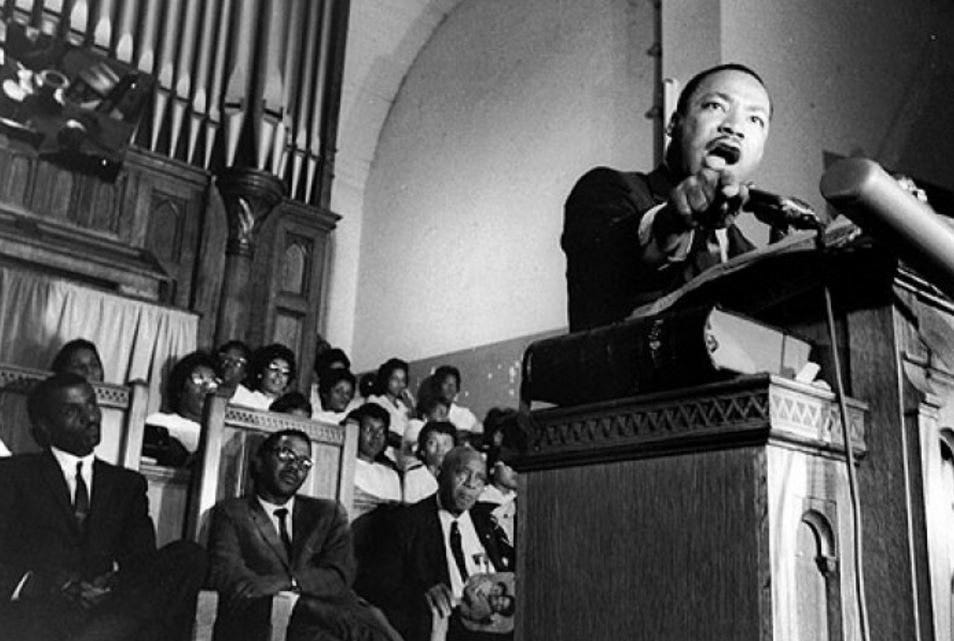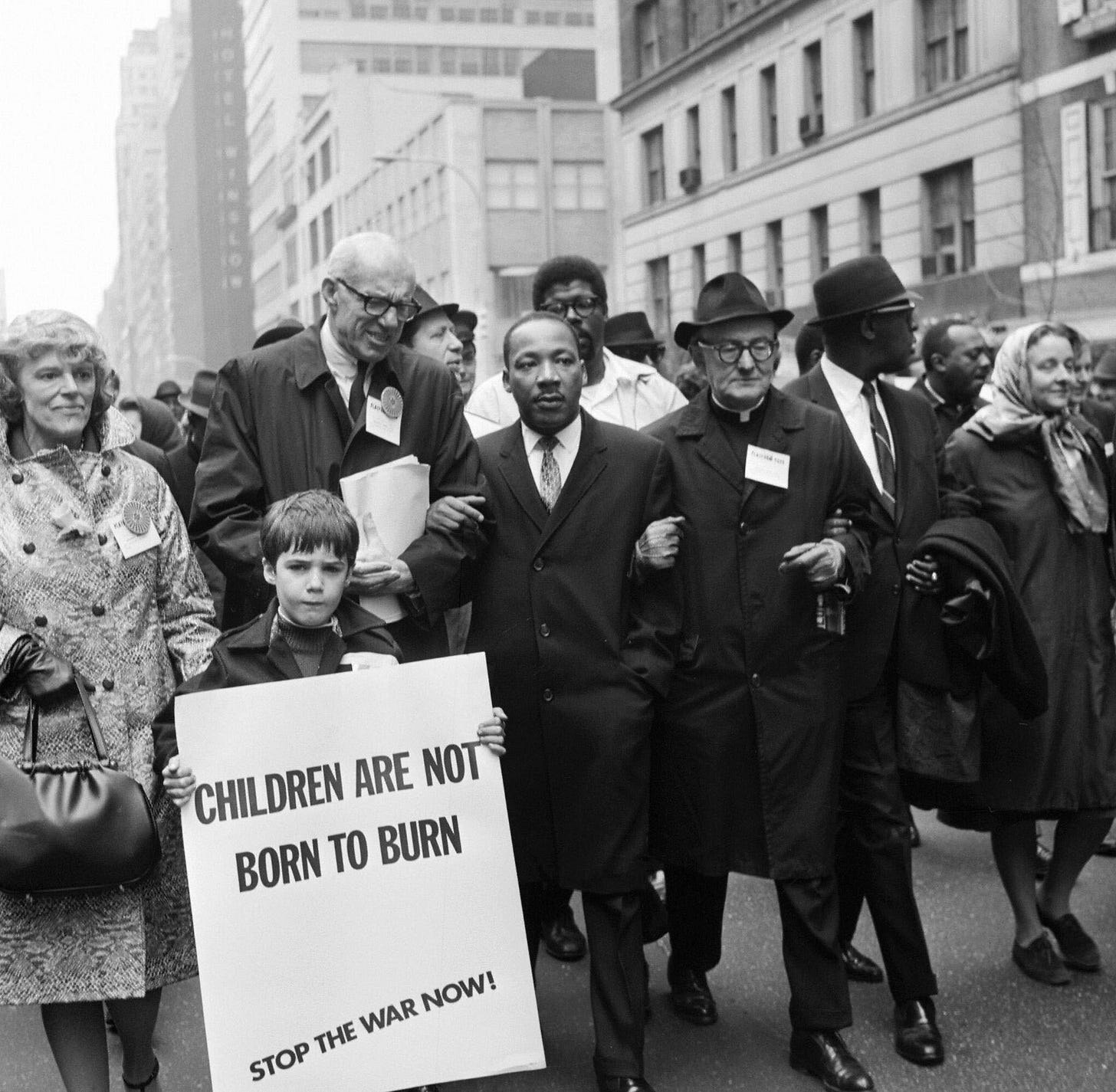Annotated Essay: What MLK’s “Beyond Vietnam” Speech Can Teach Us About Supporting Palestine In An Election Year
Much like we are today, Dr. King was faced with a tough choice: criticize a Democratic President and risk backlash, or speak out for justice. His choice can guide us in 2024.
On April 4th, 1967, Martin Luther King Jr. gave his “Beyond Vietnam: A Time To Break Silence” speech before the Riverside Church in New York City. While war in Southeast Asia is not a modern issue, in many ways, the speech pertains to the very issues antiracists and progressives face today. As part of President Lyndon B. Johnson’s political coalition, King had muted his opposition to the Vietnam War. LBJ had done more for the Civil Rights Movement than any President since Lincoln. He passed the Civil Rights Act of 1964, the Voting Rights Act of 1965, and, at the time this speech was given, the Fair Housing Act was being debated in Congress. (It was passed after MLK was assassinated.) Needless to say, there was immense political pressure for King to silence his dissent and maintain a loyal Democratic operative to advance Civil Rights.
But, for reasons you’ll see, King felt compelled to publicly condemn the injustices America was committing abroad. Afterward, King was attacked by his former allies in the liberal establishment. The Washington Post, The New York Times, and even the N.A.A.C.P. rebuked him.
“[King has] diminished his usefulness to his cause, his country, [and] his people” - The Washington Post
“The speech demagogic slander that sounded like a script for Radio Hanoi” - LIFE Magazine
As the 2024 general election creeps closer, leftists, antiracists, and decent people of all political beliefs find themselves in a similar conundrum to the one King faced. As the threat of a second, more fascist Trump presidency looms, the liberal coalition has tried to silence criticism of President Biden’s facilitation of the Palestinian genocide, claiming it bolsters the chances of Trump reclaiming the White House. I do not doubt their fear, nor do I downplay the damage Trump would do to the few democratic institutions that remain in the United States.
For guidance on how to proceed, we should listen to America’s most revered public figure, Dr. Martin Luther King Jr.
King begins his speech with what would become its hallmark passage:
“The recent statements of your executive committee are the sentiments of my own heart, and I found myself in full accord when I read its opening lines: ’A time comes when silence is betrayal.’ And that time has come for us in relation to Vietnam”
Most are familiar with King’s famous phrase, “Injustice anywhere is a threat to justice everywhere.” As he says, his continued silence on the crimes of the Vietnam War is a betrayal of his life’s purpose; the pursuit of universal justice. Avoiding criticizing LBJ might have furthered the civil rights movement in America, it would have ultimately been a betrayal of the values the movement was built upon.
“As I have moved to break the betrayal of my own silences and to speak from the burnings of my own heart, as I have called for radical departures from the destruction of Vietnam, many persons have questioned me about the wisdom of my path."Why are you speaking about the war, Dr. King?" "Aren't you hurting the cause of your people?" they ask. And when I hear them, though I often understand the source of their concern, I am nevertheless greatly saddened, for such questions mean that the inquirers have not really known me, my commitment, or my calling.
This passage conveys King’s struggle, which is synonymous with the one the left is facing today: do we criticize the Democratic president and risk a reactionary backlash? Or, do we swallow our values to reduce harm?
Above, King provides us with an answer. He states that those who urge him to keep silent on Vietnam to further his domestic goals fail to realize his true purpose. King did not march because he thought Black people should be equal to White people under American law, but because he believed all humans should be emancipated from racism, militarism, and oppression. As he tells us in “Beyond Vietnam,” King did not believe the road to Black liberation could be paved over Vietnamese bodies. If it was, the path would never lead to true equality.
“There is at the outset a very obvious and almost facile connection between the war in Vietnam and the struggle I, and others, have been waging in America. A few years ago there was a shining moment in that struggle. It seemed as if there was a real promise of hope for the poor -- both black and white -- through the poverty program. There were experiments, hopes, new beginnings. Then came the buildup in Vietnam, and I watched this program broken and eviscerated, as if it were some idle political plaything of a society gone mad on war, and I knew that America would never invest the necessary funds or energies in rehabilitation of its poor so long as adventures like Vietnam continued to draw men and skills and money like some demonic destructive suction tube. So, I was increasingly compelled to see the war as an enemy of the poor and to attack it as such.”
It is a lie to tell ourselves domestic and foreign policy can be separated. According to King, the financial and social costs of the Vietnam War drained financial resources from and broke the political coalition supporting LBJ’s War on Poverty programs. Medicare, Medicaid, increased welfare benefits, and other social programs should have been the highlight of the LBJ Presidency. Instead, much like Biden is doing today, he chose imperialism. Whatever progressive gains LBJ and Biden implemented, they come bundled with the body parts of Vietnamese and Palestinian children.




